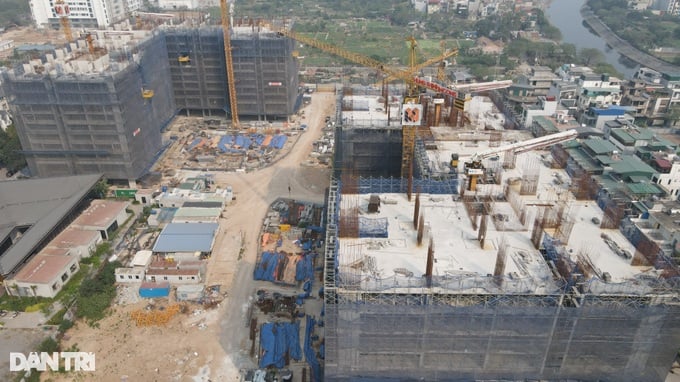We need to cover all types of deposit activities in the market.
Regarding the regulation in point d, clause 4, Article 24 of the Draft Amended Law on Real Estate Business stating that real estate project developers "are only allowed to receive deposits from customers when the housing or construction project has met all the conditions for being put into business and the transaction has been completed after the contract has been signed," Mr. Le Hoang Chau - Chairman of the Ho Chi Minh City Real Estate Association (HoREA) - believes that this regulation is correct but insufficient. He argues that it needs to be supplemented with a regulation allowing the acceptance of deposits to take place before the signing of the contract for the purchase and sale of real estate, housing, or land plots under construction.
Legal regulations regarding deposits and the need to supplement stricter regulations on accepting deposits before signing contracts for the purchase and sale of real estate, houses, and land plots under construction are necessary to ensure the consistency and uniformity of legal norms and prevent fraudulent activities.

A condominium project under construction in Hanoi (Illustrative photo: Ha Phong).
The Chairman of HoREA argued that the 2006 and 2014 Real Estate Business Laws were flawed because they only regulated real estate transactions after the contract had been signed, but did not stipulate the requirement for deposits before the contract was signed.
In reality, due to the essential need for a deposit before signing a real estate transaction contract, deposit practices remain very common and are only governed by the provisions of Clause 2, Article 328 of the 2015 Civil Code. However, the Civil Code does not specify a maximum deposit amount, leading to many cases of unscrupulous brokers, land speculators, and businesses exploiting the system to receive large deposits.
"There have been cases where deposits of up to 90-95% of the transaction value were received, then misappropriated, or even defrauded, causing losses to the depositor and also contributing to instability in the real estate market. Therefore, it is essential to regulate this in the Law on Real Estate Business," Mr. Chau stated.
However, point d, clause 4, Article 24 of the Draft Law on Real Estate Business, as amended, also repeats this shortcoming by failing to regulate deposits made before the conditions for concluding a real estate transaction contract are met. This is especially true for cases where deposits are made as a promise to buy and sell "subdivided land plots" or as a promise to buy and sell products of real estate projects before the conditions for concluding a contract are met, when there are no land use rights documents, or the competent authority has not yet "approved the investment policy simultaneously with the investor approval," or construction has not yet commenced. In such cases, the party making the deposit usually suffers the loss.
For example, if the deposit is low but the property value increases, the party receiving the deposit may be willing to cancel the deal and return the deposit (double the amount) to the depositor. Or, if the deposit is large or very large, the party receiving the deposit may commit fraud and misappropriate the customer's deposit…
Furthermore, according to Mr. Chau, point d, clause 4, Article 24 of the Draft Amended Law on Real Estate Business only stipulates the case of depositing after signing the contract for the purpose of "ensuring contract performance," but does not stipulate the case of depositing before signing the contract for the purpose of "ensuring contract conclusion." Therefore, the "scope of regulation" does not fully cover all deposit activities in the real estate market.
Based on the above analysis, he suggested adding the following content: Real estate project developers are responsible for and are only permitted to receive deposits from customers interested in buying or leasing housing or future construction projects when the project has received investment approval from the competent authority, a construction permit (if applicable), and construction has commenced. Alternatively, developers may only receive deposits from customers when the housing or construction project meets all the conditions for being put into business and the transaction has been conducted in accordance with the provisions of this Law.
"The deposit amount must not exceed 5% of the value of the house or construction project being bought, sold, or leased; the seller or lessor must clearly state the sale or lease price of the house or construction project in the deposit contract," Mr. Chau emphasized.
Prevent developers from circumventing the law.
In the preliminary review report on the revised Law on Real Estate Business by the National Assembly's Economic Committee, some opinions suggested that it is unnecessary to regulate the deposit provisions in the Law on Real Estate Business, and that these should be governed by the general provisions of the Civil Code. Therefore, the provision on "deposit" is a new provision in the draft Law; the drafting agency is requested to report and clarify the necessity and basis for proposing this regulation, especially its practical basis.
"Where necessary, only the specific provisions regarding deposits in future real estate transactions should be included in the draft Law; there is no need to repeat provisions already stipulated in the Civil Code," the review report stated.

According to experts, it is necessary to cover all deposit activities in the market to limit risks for depositors (Illustrative image: Ha Phong).
Regarding deposits in real estate transactions involving future construction projects, Minister of Construction Nguyen Thanh Nghi also stated that previously, real estate business laws did not contain regulations on this matter.
In reality, some developers circumvent the law by signing deposit contracts or other types of contracts to collect money from customers before the conditions for selling houses or construction projects are met. Therefore, this draft includes regulations on receiving deposits only when houses or construction projects have met the conditions for being put into business and conducting transactions in accordance with regulations.
Source






![[Photo] Prime Minister Pham Minh Chinh attends the Conference on the Implementation of Tasks for 2026 of the Industry and Trade Sector](/_next/image?url=https%3A%2F%2Fvphoto.vietnam.vn%2Fthumb%2F1200x675%2Fvietnam%2Fresource%2FIMAGE%2F2025%2F12%2F19%2F1766159500458_ndo_br_shared31-jpg.webp&w=3840&q=75)
































































































Comment (0)